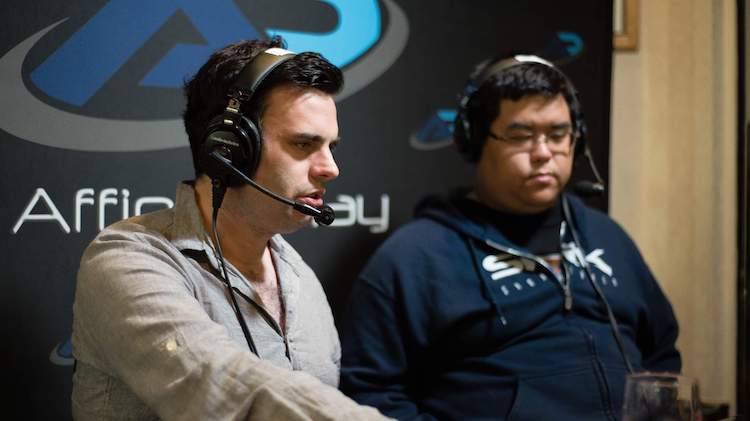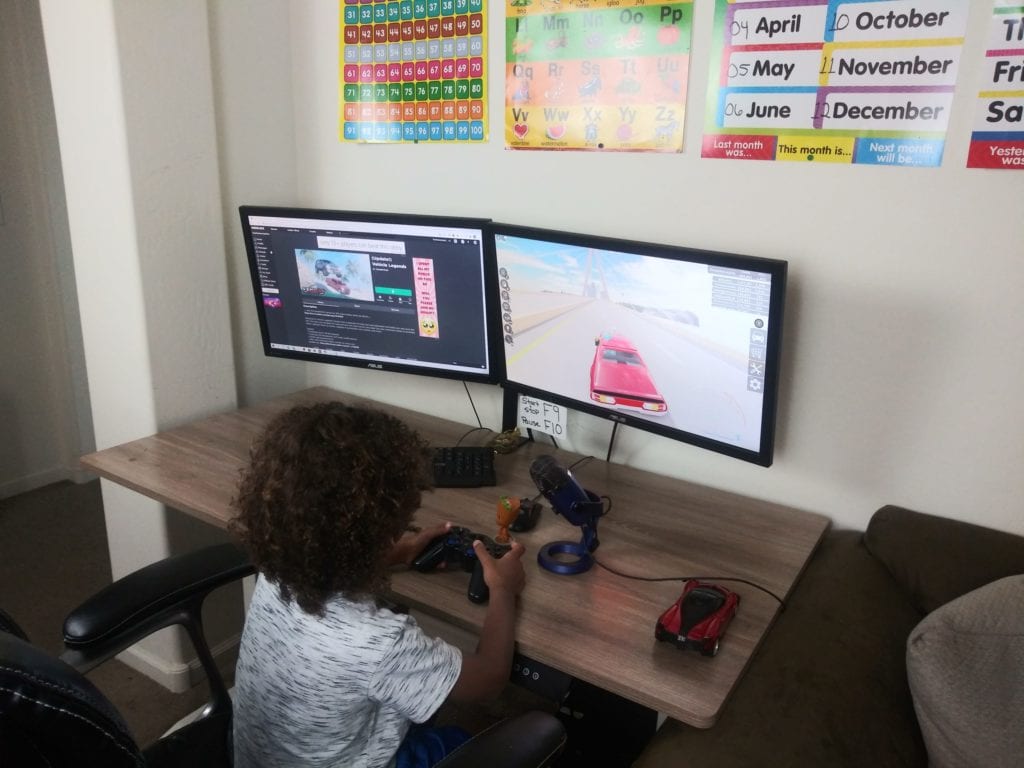What’s It Really Like to Make a Living Through Video Games?

They say if you love what you do, you’ll never work a day in your life. That’s what makes a career in playing video games so interesting to many Americans.
Video games have come a long way since the days of arcade games like Pong. Games now feature cinematic-level graphics, in-depth stories, and complicated engines. And while video games have always had a competitive aspect, never before have people been able to make money through games as they can now.
It sounds like a dream for any gamer – your full-time job can genuinely be playing video games these days. And there are multiple ways to do it. Some people play competitive esports for cash prizes, others build followings and earn money through YouTube or Twitch. Although it might literally seem like all fun and games, the gaming industry is hard to get into, and often harder to survive in.
We chatted with four people who have blazed a path in the gaming industry to get a sense of their successes, challenges, and takeaways from earning a living through games.
“Explaining to people not familiar with the industry was a challenge. The question is always ‘Oh, so you get paid to play video games all day?!'” said Dee Rock, a Twitch streamer and eSports broadcaster who goes by BBXH. “Answer: ‘Heh, yes, and no.’ It’s still a new concept but it’s becoming more mainstream. I almost felt embarrassed explaining what I did at first. Now, I’m proud. I’m excited to share what I do.”
Making Money From Video Games
Dee Rock entered the gaming industry in March 2016 and joined Twitch that year to stream the mobile game Clash Royale. She spent much of her free time outside of work streaming, and before the end of the year, her efforts began to pay off. Rock was invited to Toronto to host and broadcast a Clash Royale tournament sponsored by Northern Arena, one of Canada’s premier eSports brands.

And like that, she was hooked. Rock spent the rest of the year using any vacation days she had available at work to attend events and host streams. Before she knew it, however, she was out of vacation days. She had earned some money in the gaming industry but wasn’t committed to it as a living yet. That changed when she was offered a chance to host a tournament in Paris, which would conflict with her office job. Confident in her abilities and eager to take the next step, Rock left her office job to work in gaming full time.
“It was terrifying as this meant switching from a ‘safe’ career to a more adventurous one,” she said. “It ultimately has been the right choice for me. I’ve gotten to meet amazing people and travel the world all while doing a job I love.”
Now fully investing her time into creating content, Rock works from 7 a.m. to 2 p.m. EST, Monday through Friday. In addition, she’ll occasionally spend weekends or nights on stream if there are events or collaborations planned. And her leap of faith has paid off. Not only did Rock land her dream job, but she also now makes 40 percent more than she did in her office job. She has to wear multiple hats at once – streamer, broadcaster, sponsor, video creator, etc – but loves each one.
Over the last few years of grinding and growing as a streamer and broadcaster, Rock has learned a lot – especially with how to roll with the punches.
“Working in this industry can be a rollercoaster. You never really know how your day is going to go,” Rock said. “New and exciting work seems to pop up randomly. Sometimes a generous donor shows up to the stream and drops a crazy donation or even trolls come into the chat to try to get under your skin. It could be anything!”
The Love of the Games

Paul Harrison has seen similar ups and downs during his decade in the industry. Harrison has worked as a gaming journalist, streamer, and professional commentator. He earned a degree in interactive entertainment, and immediately entered the industry as a freelance journalist. Harrison also runs the site FictionEarth.com, a creative writing blog. Overall, his experiences have been positive, propelled by the passion of video game fans.
“There’s just so much joy in the community, I truly love it,” Harrison said.
Harrison has done everything from small streams to promotional events, to broadcasting the Canada Cup, the nation’s largest eSports fighting tournament. After years in the gaming community, Harrison has learned to take the good with the bad.
“A lot of gamers sit at home throwing random insults at you on your stream. I personally just ignore all that, but I know some friends who are affected by it, and it’s easy to see why. It can be hard seeing so many hateful comments from people you don’t even know,” he said.
“Provided you can ignore the hate-messages and focus on what matters then there is definitely a lot of fun to be had in this industry.”
The Challenges of Streaming
While Twitch streaming is the hot ticket in the gaming industry today, it’s not the only way to make a living off gaming. Twitch offers a platform for both streamers and viewers to connect but also features a heavily saturated market. It’s difficult, and sometimes impossible, for new streamers to make a name for themselves on Twitch – something Bryan Truong found out firsthand.
Truong grew up imagining making living playing games but was enlisted in the U.S. Navy at the time Twitch started to get popular. When he left the service and had more time, he discovered Twitch may not be the platform for him.
“I tried to make a go of it as Twitch became more popular, but it’s not as easy as it sounds. I give an immense amount of respect to pro Twitch players because it’s not easy being successful,” Truong said. “They’re basically a one-person show, and multi-task talking to an audience while still playing a game. It’s a ton of work and effort that I just couldn’t keep up with.”
Turned off by Twitch but still dedicated to paving a path in gaming, Truong founded GameCows, a board and tabletop game review site. In addition, Truong still earns some income on the side as a video game playtester. While he still loves what he does, Truong noted that he doesn’t view games the same way anymore.

“Playing games for a living does change your perspective of the game. It’s no longer about simply the enjoyment of a game although it’s still fun,” he said. “Whenever I play a game whether it’s for playtesting or reviews, it’s second nature to look at from a structural viewpoint.”
Building a Channel on YouTube
Many people who have found success in the industry spent years finding their niche. Others have found avenues into the industry more quickly. Like, really quickly. Marie helps her five-year-old son run manage a YouTube channel, TheMaskedJayDee, where he regularly posts streams and videos. While JayDee has just a few hundred subscribers on YouTube now, Marie said that it provides an excellent creative outlet for her son, while also setting the groundwork for a steady financial future.
Marie, who goes by “Momager” on YouTube and Instagram, had JayDee in her late 30s and knew quickly that she wanted to set her son on the right path.

“Just like every parent, you want your child to be happy, healthy, safe, and have lots of friends. In my case, the one worry that stood out, ‘where will my baby be if we weren’t there to help him’?” Marie said. “That reset my purpose in life to ensure JayDee’s financial well-being. It makes me emotional just thinking about giving him a foundation with a full career attached to it.”
Marie is dedicated to helping her son’s channel grow. She utilizes SEO tactics to help his videos stand out and runs promotions to help promote TheMaskedJayDee. She said she had to learn a lot to help her son get started, and she’s constantly learning more.
“At the beginning of, ‘let’s start a YouTube Channel’ I failed to realize that the equipment was important,” she said. “Two computers – one was a restored computer from Newegg, and the other was a hand-built computer – three monitors, and endless accessories later, and the learning curve continues.”
Like others in the field, one of Marie’s greatest takeaways is simple: enjoy yourself. After all, video games are designed to be fun.
“We never pressure him to record playing video games; this was to be fun, not damaging. JayDee and I would talk about how he felt about recording, and just like anyone, he was super shy. But once he was over his shyness, game on!” she said. “He’s happy; everyone’s satisfied with the rules in place. That’s what’s essential to make this journey fun for everyone.”
Her son typically plays an hour on weekdays and two hours on the weekends. It’s up to JayDee whether he wants to go live on YouTube, or just play around on his own. Marie also balances his screen time, making sure he spends time outside with friends after school. In the meantime, she seeks video editors and ways to grow the channel.
“The key is to have fun and not take anything personally. And have a deep understanding that this is a long unpaid gig,” she said.
The Bottom Line
Building a career in gaming is rewarding, but often difficult work. Each person we spoke to about their experience had a very positive attitude but was open about some of the challenges that come with the territory. To really make a career in gaming work, you often need some thick skin and an open mind.
Moreover, on top of the work, successful professionals are very flexible and creative. The gaming industry is rapidly changing and developing, so being able to think on your feet and take on new challenges is key to building your career.
Perhaps above all else, you need confidence. It can be daunting to get started, whether you’re coming in from scratch or leaving a career behind to enter the industry. Faith in yourself, your ability, and your content is key to blazing a path in the video game world.









